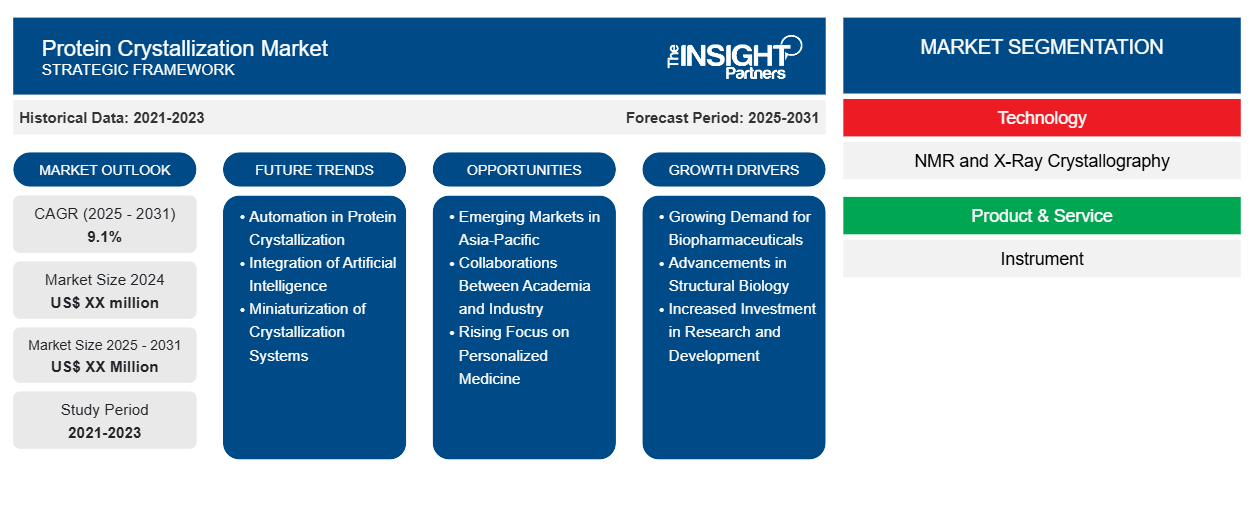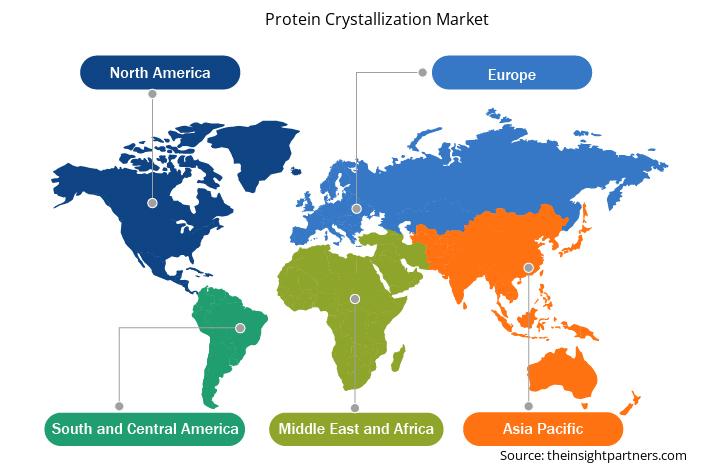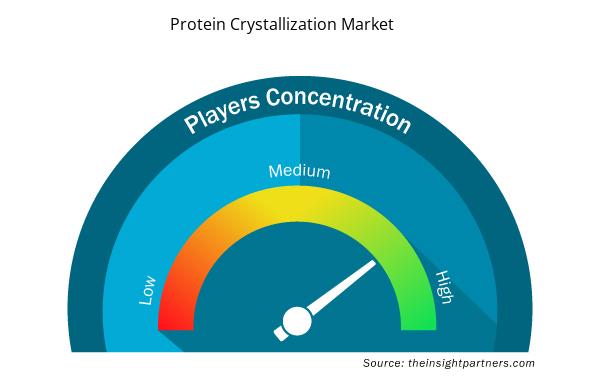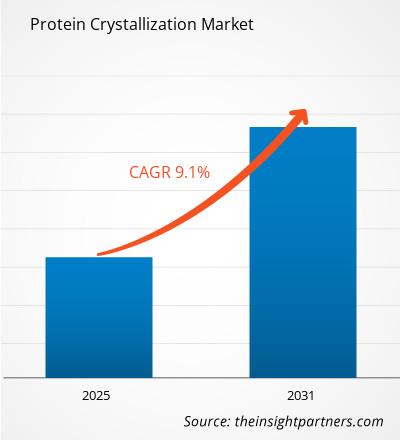The Protein Crystallization Market is expected to register a CAGR of 9.1% from 2025 to 2031, with a market size expanding from US$ XX million in 2024 to US$ XX Million by 2031.
The report is segmented by Technology (NMR and X-Ray Crystallography), Product & Service {Instrument (Liquid Handling (Automated)}, Consumable (Reagent and Microplate), and End user (Pharmaceutical Companies, Research & Government Institutes, and Biotechnology Companies)
Purpose of the Report
The report Protein Crystallization Market by The Insight Partners aims to describe the present landscape and future growth, top driving factors, challenges, and opportunities. This will provide insights to various business stakeholders, such as:
- Technology Providers/Manufacturers: To understand the evolving market dynamics and know the potential growth opportunities, enabling them to make informed strategic decisions.
- Investors: To conduct a comprehensive trend analysis regarding the market growth rate, market financial projections, and opportunities that exist across the value chain.
- Regulatory bodies: To regulate policies and police activities in the market with the aim of minimizing abuse, preserving investor trust and confidence, and upholding the integrity and stability of the market.
Protein Crystallization Market Segmentation
Technology
- NMR and X-Ray Crystallography
Product & Service
- Instrument
Consumable
- Reagent and Microplate
End user
- Pharmaceutical Companies
- Research & Government Institutes
- Biotechnology Companies
Customize This Report To Suit Your Requirement
You will get customization on any report - free of charge - including parts of this report, or country-level analysis, Excel Data pack, as well as avail great offers and discounts for start-ups & universities
Protein Crystallization Market: Strategic Insights

- Get Top Key Market Trends of this report.This FREE sample will include data analysis, ranging from market trends to estimates and forecasts.
Protein Crystallization Market Growth Drivers
- Growing Demand for Biopharmaceuticals: The increasing demand for biopharmaceutical products, including monoclonal antibodies, vaccines, and gene therapies, is driving the protein crystallization market. Protein crystallization techniques are essential for understanding the structure of proteins, enabling drug discovery and development processes, thus fostering growth in the biopharmaceutical industry and protein crystallization services.
- Advancements in Structural Biology: The rising importance of structural biology in understanding protein functions and developing targeted therapies is driving the growth of the protein crystallization market. Crystallization plays a critical role in protein structure determination, fueling demand for crystallization services and technology across academic, pharmaceutical, and research institutions.
- Increased Investment in Research and Development: Growing investments in biotechnology and pharmaceutical R&D activities are propelling the need for protein crystallization. As researchers strive to uncover novel drug targets, protein crystallization becomes essential in studying protein structures for drug discovery, contributing to the increased demand for related technologies and services.
Protein Crystallization Market Future Trends
- Automation in Protein Crystallization: Automation is becoming a key trend in the protein crystallization market. Automated platforms and robotic systems are increasingly used to streamline the crystallization process, enhancing throughput, reproducibility, and efficiency. These automated systems reduce the time and cost associated with manual methods, driving their adoption in research and industry.
- Integration of Artificial Intelligence: The integration of artificial intelligence (AI) and machine learning with protein crystallization techniques is transforming the market. AI algorithms are used to predict crystal growth conditions and optimize crystallization parameters, improving the success rate and efficiency of crystallization processes, and accelerating drug discovery and structural biology research.
- Miniaturization of Crystallization Systems: The trend toward miniaturization of protein crystallization systems is gaining traction. Small-scale crystallization systems are enabling researchers to conduct high-throughput experiments with minimal reagent usage, reducing costs and enhancing the speed of protein structure determination, making these systems increasingly popular in drug discovery and academic research.
Protein Crystallization Market Opportunities
- Emerging Markets in Asia-Pacific: The Asia-Pacific region presents significant opportunities for the protein crystallization market. With growing investments in biotechnology and pharmaceuticals, countries like China and India are rapidly expanding their research capabilities, driving the demand for advanced protein crystallization technologies and services in the region.
- Collaborations Between Academia and Industry: Increasing collaborations between academic institutions and biotechnology/pharmaceutical companies create opportunities for protein crystallization companies. These partnerships enable the commercialization of research, driving demand for crystallization solutions that support drug discovery, structural biology research, and personalized medicine applications.
- Rising Focus on Personalized Medicine: The growing focus on personalized medicine presents an opportunity for protein crystallization technologies. As personalized medicine aims to develop drugs tailored to individual genetic profiles, protein crystallization plays a crucial role in understanding protein structures and developing therapies that are customized to meet the specific needs of patients.
Protein Crystallization Market Regional Insights
The regional trends and factors influencing the Protein Crystallization Market throughout the forecast period have been thoroughly explained by the analysts at Insight Partners. This section also discusses Protein Crystallization Market segments and geography across North America, Europe, Asia Pacific, Middle East and Africa, and South and Central America.

- Get the Regional Specific Data for Protein Crystallization Market
Protein Crystallization Market Report Scope
| Report Attribute | Details |
|---|---|
| Market size in 2024 | US$ XX million |
| Market Size by 2031 | US$ XX Million |
| Global CAGR (2025 - 2031) | 9.1% |
| Historical Data | 2021-2023 |
| Forecast period | 2025-2031 |
| Segments Covered |
By Technology
|
| Regions and Countries Covered | North America
|
| Market leaders and key company profiles |
Protein Crystallization Market Players Density: Understanding Its Impact on Business Dynamics
The Protein Crystallization Market market is growing rapidly, driven by increasing end-user demand due to factors such as evolving consumer preferences, technological advancements, and greater awareness of the product's benefits. As demand rises, businesses are expanding their offerings, innovating to meet consumer needs, and capitalizing on emerging trends, which further fuels market growth.
Market players density refers to the distribution of firms or companies operating within a particular market or industry. It indicates how many competitors (market players) are present in a given market space relative to its size or total market value.
Major Companies operating in the Protein Crystallization Market are:
- Thermo Fisher Scientific
- Agilent Technologies
- GE Healthcare Life Sciences
- SPEX CertiPrep
- Rigaku Corporation
- Hampton Research
Disclaimer: The companies listed above are not ranked in any particular order.

- Get the Protein Crystallization Market top key players overview
Key Selling Points
- Comprehensive Coverage: The report comprehensively covers the analysis of products, services, types, and end users of the Protein Crystallization Market, providing a holistic landscape.
- Expert Analysis: The report is compiled based on the in-depth understanding of industry experts and analysts.
- Up-to-date Information: The report assures business relevance due to its coverage of recent information and data trends.
- Customization Options: This report can be customized to cater to specific client requirements and suit the business strategies aptly.
The research report on the Protein Crystallization Market can, therefore, help spearhead the trail of decoding and understanding the industry scenario and growth prospects. Although there can be a few valid concerns, the overall benefits of this report tend to outweigh the disadvantages.
- Historical Analysis (2 Years), Base Year, Forecast (7 Years) with CAGR
- PEST and SWOT Analysis
- Market Size Value / Volume - Global, Regional, Country
- Industry and Competitive Landscape
- Excel Dataset



Report Coverage
Revenue forecast, Company Analysis, Industry landscape, Growth factors, and Trends

Segment Covered
This text is related
to segments covered.

Regional Scope
North America, Europe, Asia Pacific, Middle East & Africa, South & Central America

Country Scope
This text is related
to country scope.
Frequently Asked Questions
The key drivers include the growing demand for biopharmaceuticals, advancements in structural biology, and increased investments in R&D by the pharmaceutical and biotechnology industries.
Automation streamlines the crystallization process by increasing throughput, reproducibility, and efficiency, reducing manual intervention, and accelerating the discovery of protein structures, thereby driving market growth.
AI enhances the protein crystallization process by predicting optimal growth conditions and crystallization parameters, improving success rates, and accelerating structural biology and drug discovery research.
North America holds the largest share, driven by the presence of leading pharmaceutical companies, high research investments, and advanced infrastructure for drug discovery and development.
Opportunities include expansion in the Asia-Pacific region, collaborations between academia and industry, and the rising focus on personalized medicine, which requires precise protein structure analysis.
The market is projected to grow at a CAGR of 9.1% from 2024 to 2031, driven by increasing demand for biopharmaceuticals, innovations in crystallization technology, and growing investments in structural biology research.
Trends and growth analysis reports related to Life Sciences : READ MORE..
- Thermo Fisher Scientific
- Agilent Technologies
- GE Healthcare Life Sciences
- SPEX CertiPrep
- Rigaku Corporation
- Hampton Research
- Brookhaven Instruments
- Formulatrix, Inc.
- Bio-Rad Laboratories
- Jena Bioscience GmbH

 Get Free Sample For
Get Free Sample For